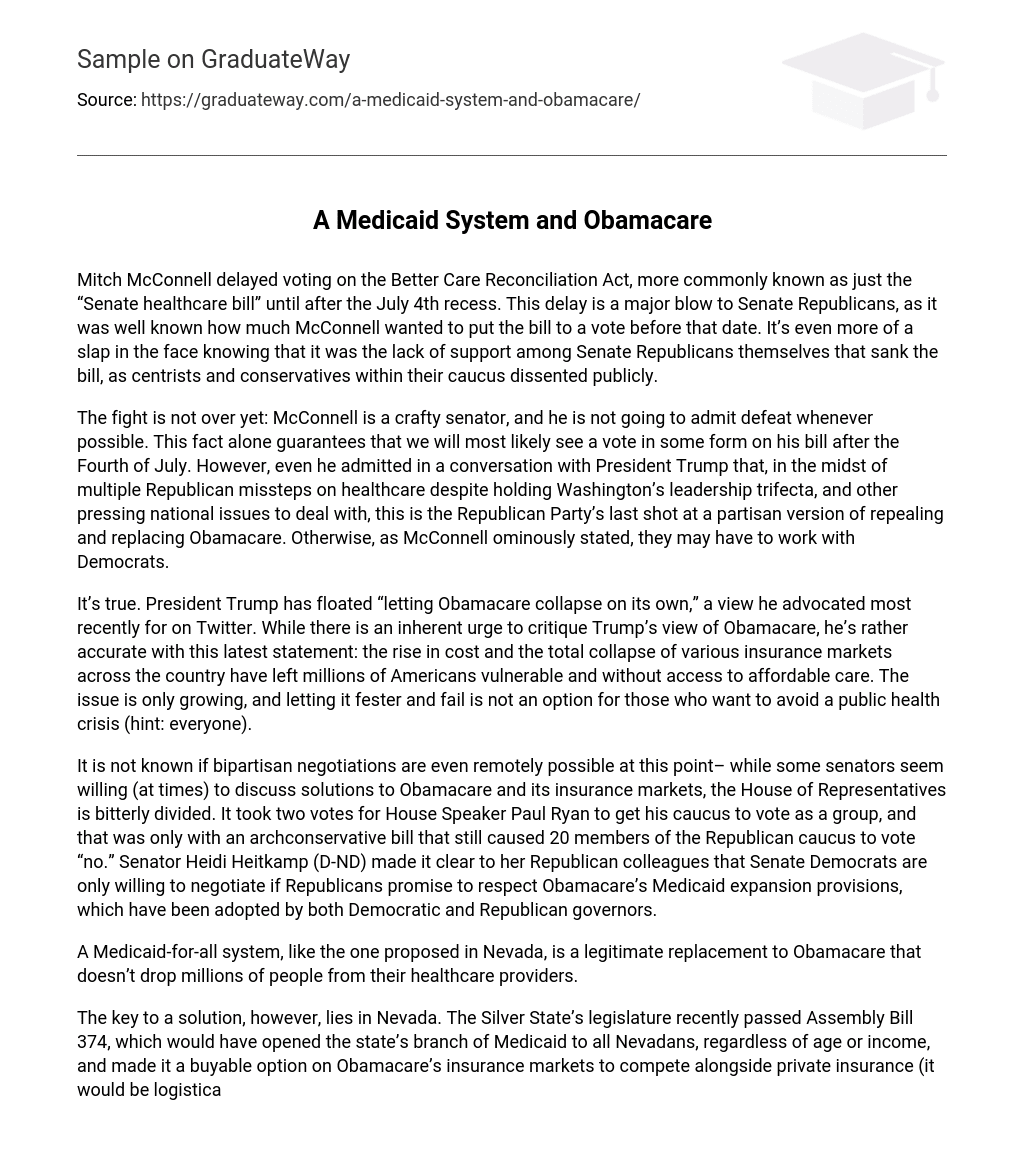Mitch McConnell delayed voting on the Better Care Reconciliation Act, more commonly known as just the “Senate healthcare bill” until after the July 4th recess. This delay is a major blow to Senate Republicans, as it was well known how much McConnell wanted to put the bill to a vote before that date. It’s even more of a slap in the face knowing that it was the lack of support among Senate Republicans themselves that sank the bill, as centrists and conservatives within their caucus dissented publicly.
The fight is not over yet: McConnell is a crafty senator, and he is not going to admit defeat whenever possible. This fact alone guarantees that we will most likely see a vote in some form on his bill after the Fourth of July. However, even he admitted in a conversation with President Trump that, in the midst of multiple Republican missteps on healthcare despite holding Washington’s leadership trifecta, and other pressing national issues to deal with, this is the Republican Party’s last shot at a partisan version of repealing and replacing Obamacare. Otherwise, as McConnell ominously stated, they may have to work with Democrats.
It’s true. President Trump has floated “letting Obamacare collapse on its own,” a view he advocated most recently for on Twitter. While there is an inherent urge to critique Trump’s view of Obamacare, he’s rather accurate with this latest statement: the rise in cost and the total collapse of various insurance markets across the country have left millions of Americans vulnerable and without access to affordable care. The issue is only growing, and letting it fester and fail is not an option for those who want to avoid a public health crisis (hint: everyone).
It is not known if bipartisan negotiations are even remotely possible at this point– while some senators seem willing (at times) to discuss solutions to Obamacare and its insurance markets, the House of Representatives is bitterly divided. It took two votes for House Speaker Paul Ryan to get his caucus to vote as a group, and that was only with an archconservative bill that still caused 20 members of the Republican caucus to vote “no.” Senator Heidi Heitkamp (D-ND) made it clear to her Republican colleagues that Senate Democrats are only willing to negotiate if Republicans promise to respect Obamacare’s Medicaid expansion provisions, which have been adopted by both Democratic and Republican governors.
A Medicaid-for-all system, like the one proposed in Nevada, is a legitimate replacement to Obamacare that doesn’t drop millions of people from their healthcare providers.
The key to a solution, however, lies in Nevada. The Silver State’s legislature recently passed Assembly Bill 374, which would have opened the state’s branch of Medicaid to all Nevadans, regardless of age or income, and made it a buyable option on Obamacare’s insurance markets to compete alongside private insurance (it would be logistically separate from Nevada’s core Medicaid program, which would continue to serve those below the poverty line without new costs). The bill, nicknamed “Sprinklecare” after its sponsor in the Nevada Assembly, was vetoed by Nevada Gov. Brian Sandoval, who criticized the bill as leaving too many questions about insurance unanswered.
While the bill didn’t pass, it should serve as an example for not only other states, but also for the Senate (and hopefully the House). If the Republican caucus breaks down like it reliably has when McConnell puts the Senate bill up to a vote, then bipartisan cooperation is key to passing an actual solution to America’s healthcare dilemma. Relying on private insurance companies like Obamacare did is a recipe for disaster, as the collapse of insurance markets has shown us. Insurance companies are just that: companies, and their bottom line will always outrank the needs of the public in priorities.
A Medicaid-for-all system, like the one proposed in Nevada, is a legitimate replacement to Obamacare that doesn’t drop millions of people from their healthcare providers. The only major difference that would be obvious is that rather than being sold on Obamacare’s insurance exchanges, a national version of this plan (or fifty state versions backed by federal dollars) would be offered in place of the insurance markets altogether, which would be scrapped if Obamacare were repealed. It allows those who already had providers outside of Obamacare to keep those providers, while providing an affordable, well equipped alternative for those who couldn’t afford healthcare, or find a provider in their area.
In the case that such a bill were to be debated, provisions concerning essential benefits, incentives for individuals and states to sign up, and other details would still need to be fully hashed out. But unlike the healthcare bills displayed over the last few months, this plan provides a model for a real, lasting solution for America’s healthcare system that, as it almost did in Nevada, has the possibility of being truly bipartisan. While this is still the beginning of what will be a long debate over the entirety of Trump’s first term (and probably past it, if no one budges), Nevada’s bill proves that a real solution to Obamacare’s problems can be found without harming people’s livelihoods.





